What’s nine times 27? The answer is somehow 270 days due to the weird math of the Gregorian calendar. That also means we’re 74 percent of the way 2022, and there’s just one more quarter to go. This is Charlottesville Community Engagement, a newsletter and podcast that doesn’t keep score. I’m your host, Sean Tubbs.
On today’s program:
A major by-right development with 245 units is planned for land along the Rivanna River in Charlottesville
Charlottesville resumes the review of the names of two elementary schools
The public comment period has now opened for a proposed revocation of the state’s 2021 model policy on transgendered students
A committee of the Board of Visitors discusses the future of coal power at the University of Virginia
Charlottesville’s Climate Action Plan is out for your review
First shout-out: eBike Demo Day coming up on October 16
Are you interested in a climate-friendly, family-friendly way to replace short car rides? Have you heard about eBikes? Wondering what kind might be right for you? Join Livable Cville on Sunday, October 16 from 2–4pm at Meade Park in Charlottesville for a fun afternoon with lots of eBikes owners you can talk to and several types of eBikes you can take for short test rides. Everyone is invited to Bike Demo Day. To learn more, please visit livablecville.org.
Plans filed for 245 units along Rivanna River on land in floodplain
An entity called Seven Development LLC has filed a site plan with the City of Charlottesville to build 245 apartment units on nearly seven acres of land near the Rivanna River within land within the floodplain.
No rezoning or special use permit is required and the site plan drawn up by Shimp Engineering does not show any critical slopes that will be disturbed. That means Charlottesville must approve the project if the developer can demonstrate they have met all of the technical requirements.
The project has a working address of 0 East High Street. According to the city’s Geographical Information System, the entire project is within what’s known as the one percent exceedance floodplain as maintained by the Federal Emergency Management Agency. That’s often referred to as the 100 year floodplain. (See also: Nassau Street rezoning yields additional unit)
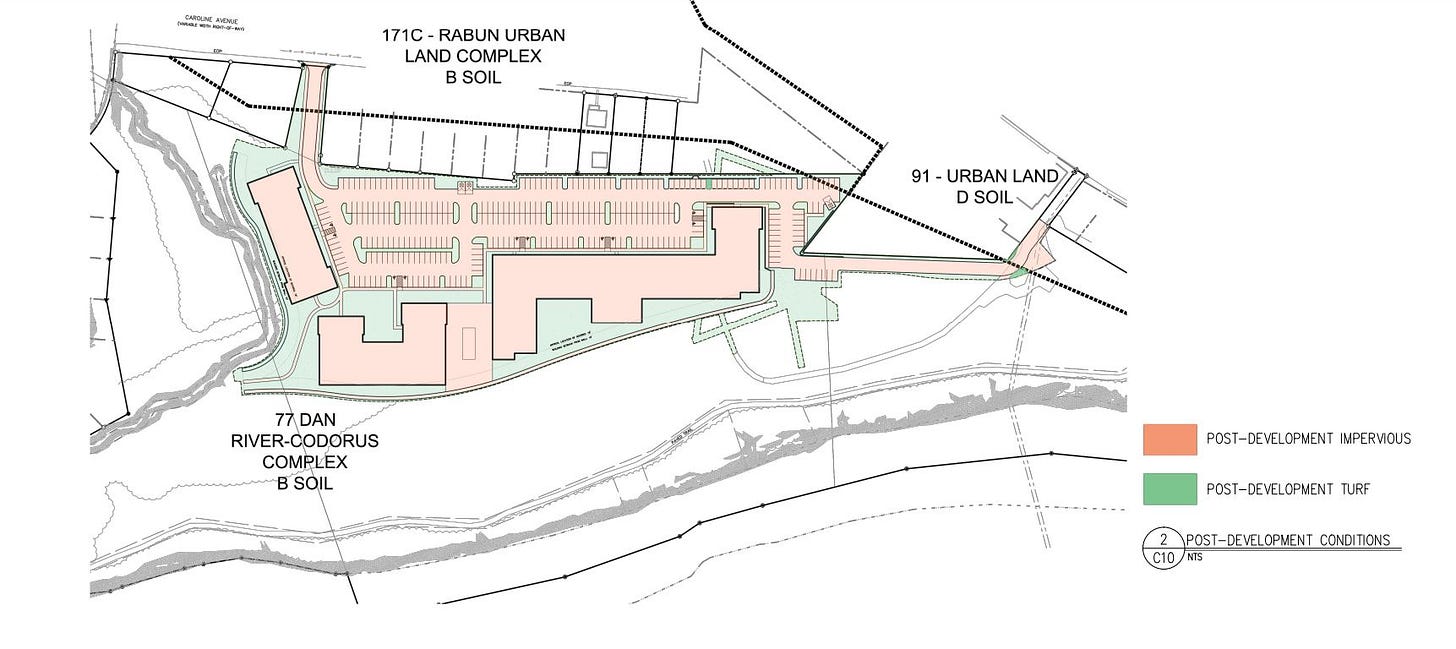
The rest of the land is within the regulatory floodway and that border would be noted with a retaining wall that would be a maximum of 15 feet high. Most of the land is zoned either B-1 or B-3.
The three buildings would each have a height of four stories and a total footprint of 322,000 square feet. Each would constructed on fill to elevate the foundation above the current topography, out of the floodplain.
Building A would have 45 units and the foundation would be at 334 feet above sea level (FFE). Building B would have 60 units and be at 335 feet. Building C would have 140 units and also would be at 335 feet.
There are several parcels involved with the transaction, all three of which are owned by developer Wendell Wood under the name Southern Vector or Southern Ventures. These include a small sliver on Caroline Avenue that would be used for the southern entrance for the project. The city of Charlottesville would have to accept that into the city’s road system.
The 320 parking spaces for the project would be built between a row of single family homes on Caroline Avenue and the buildings.
The northern entrance would skirt along another property heading through a narrow portion of the property that terminates at East High Street about a tenth of a mile away from its intersection with U.S. 250.
A traffic count in the site plan estimates that the project will generate 1,334 trips per day.
The site plan states the project would be at 12 dwelling units per acre. That calculation uses the entire 20.813 acres of the three parcels of land involved.
The site plan shows that 8.9 percent of the total property will be structures, 11.1 percent will become pavement, and 2.5 percent will be sidewalk. The remaining 77.5 percent will remain in open space. There would be 123 bicycle spaces would be provided.
The stormwater plan shows two outfalls from the site with one collecting into an underground storage facility. The other will use something called an “engineered level spreader.”
Update:
A site plan conference will be held Wednesday, October 5 at 10 a.m. on Zoom. That will be the only public meeting except for any neighborhood meetings the developer might voluntarily call.
The city’s comments on the project will be sent to the developer by October 28.
Charlottesville schools resume name review for Clark, Venable schools
The names of several schools in Albemarle have recently been changed to new ones per a policy initiated by School Superintendent Matthew Haas in October 2018. Now Charlottesville City Schools has resumed the process of determining whether its own facilities are appropriately named and Clark Elementary and Venable Elementary are up first.
“Like many communities, universities, and K-12 schools across the country, Charlottesville City Schools is aware that our schools’ names send a message to our students, staff, and community and should therefore reflect our values,” reads a webpage on the topic on the school system’s website.
Phil Varner, a member of the city’s Historic Resources Committee, has compiled a list of resources for namesakes that was first published in October 2020, but the work was put on hold while the search for a new superintendent took place.
According to the options in a survey, the three choices are:
Keep the names and their association with George Rogers Clark and Charles Scott Venable
Keep the names but end the association with those individuals
Find new names entirely
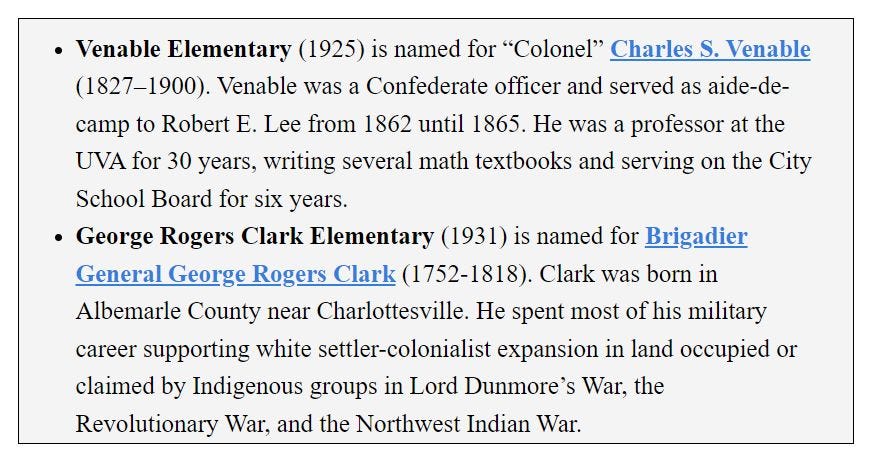
Public comment window open for changes to Virginia public school policy on transgendered students
The Commonwealth of Virginia offers an opportunity for the public to comment on a wide variety of public policy changes through something called the Regulatory Townhall. Currently there are forums for 27 regulatory activities and 25 amendments to policy guidance.
The 30-day window is about to close for changes to how transient occupancy taxes are collected, and there have been no comments. In fact, most policy changes attract little to no attention from the public. Some do. For instance, there are 20 comments for revisions of the Child Care Subsidy Program administered by the State Board of Education.
The window opened yesterday for comments on Governor Glenn Youngkin’s proposed revocation of the 2021 model policy for transgendered students. (See also: Youngkin administration seeks to revoke transgender policy for Virginia public schools)
“The Code of Virginia reaffirms the rights of parents to determine how their children will be raised and educated,” reads the description the public comment forum for this proposed change. “Empowering parents is not only a fundamental right, but it is essential to improving outcomes for all children in Virginia.”
As of this writing, there were nearly 16,000 comments, a number that will likely be outdated by the time you read this. The window closes on October 26, 2022 and the Board of Education may take a vote at their meeting in mid-November. When that happens, the event will be live-streamed on the Virginia Department of Education YouTube page.

Second shout-out: Charlottesville Community Bikes
In this second subscriber supported shout-out, Charlottesville Community Bikes believes that bicycles can be a means to social change, addressing issues of equity, access, and inclusion. They provide free bikes to adults who need one, and have a special program that provides free bikes to children. Their mobile bike repair clinics continue September 29 with a stop on Michie Drive. Want to learn more or support their work? Charlottesville Community Bikes currently is seeking matching funds for a grant from the Outride Fund. Visit charlottesvillecommunitybikes.org to learn more.
UVA continues to use coal as a backup to Charlottesville gas
As the temperatures get colder, thoughts of many turn to how homes and businesses will be heated in the winter months. The University of Virginia continues to burn coal for a portion of the year to supplement the natural gas it purchases from the city of Charlottesville.
The topic came up at the end of the University of Virginia Board of Visitors’ Buildings and Grounds Committee on September 15. University of Virginia Architect Alice Raucher provided an overview of UVA’s sustainability goals.
“The big goal of course is carbon neutrality by 2030 and fossil-fuel free by 2050,” said Alice Raucher, the University of Virginia architect.
The discussion gave the chance to provide an update on how UVA is doing.
“We have reduced our carbon footprint over the last ten years by 43 percent,” Raucher said. “We have some utility solar fields that we have partnered with Dominion Energy on in the state of Virginia where the power goes into the grid.”
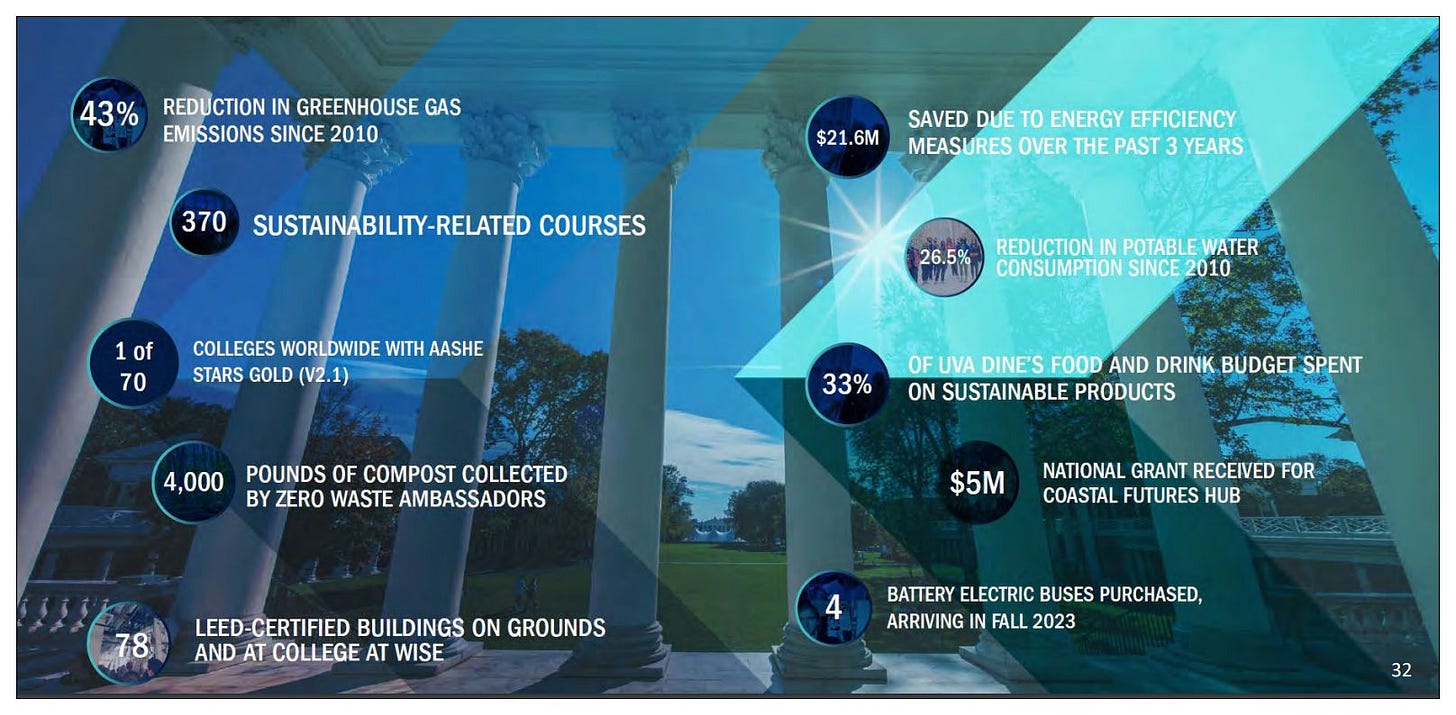
Raucher said the Buildings and Grounds Committee will be briefed on more initiatives in the years to come.
One new member of the committee appointed by Governor Glenn Youngkin asked a question about a controversial piece of infrastructure. Bertram Ellis Jr. is a member of the class of 1975 whose appointment this year has been controversial among some students, according to this article in InsideHigherEd.
“What is the future of the coal silos right over there across the street from the Spot?” Ellis asked.
“That is a good question,” Raucher said. “Right now our heat plant needs to burn coal because… the city’s ability to supply natural gas in the winter when it’s really cold in the winter is too much for them to handle and we get curtailed.”
Raucher said the coal tower is a back-up.
“Long-term we’d like to get off of coal,” Raucher said.
“Do we have to get our gas from the city,” Ellis asked.
“We do, unless we run our own pipeline,” Raucher said.
President Jim Ryan summed up the situation.
“So there are a couple of other options,” Ryan said. “One is to see if we can get more gas from the town and that’s not been successful so far but something to keep thinking about. You could have alternative backups and one of them is oil but oil is not much better than coal. The other is geothermal.”
Raucher said UVA is exploring that option and is working with a consultant to determine a way forward. The next step is to drill some test wells around Grounds.
“We think we have good underground conditions that would support geothermal,” Raucher said.
The next meeting of the UVA Board of Visitors is December 8 through December 9.
City Climate Action plan now available for review
Finally today, Charlottesville City Council will take up a draft Climate Action Plan at its next meeting on October 3 at a work session that begins at 4 p.m.
“The plan builds upon past work of the City’s Climate Program and provides a strategic framework to guide City and community actions to achieve our greenhouse gas (GHG) reduction goals of 45% by 2030 and carbon neutrality by 2050,” reads a press release that went out this morning.
The plan notes that Charlottesville Gas stopped advertising new for customers in the city of Charlottesville. The University of Virginia is mostly located within Albemarle County.
“Some community input on this plan also advocated to restrict any new hook ups within the gas system’s existing territory,” reads page 75 of the draft plan. “Charlottesville’s legal authority to do this is unknown at this time and is included in the Decarbonization of Gas Utility Study.”
Albemarle County completed a Climate Action Plan in October 2020 and have now turned their attention to developing a climate resilience plan. There’s an information meeting on that this Thursday night that will delve into the Climate Vulnerability and Risk Assessment released in June 2022.
More on Charlottesville’s draft Climate Action Plan in future installments of Charlottesville Community Engagement. Plan to take a look!
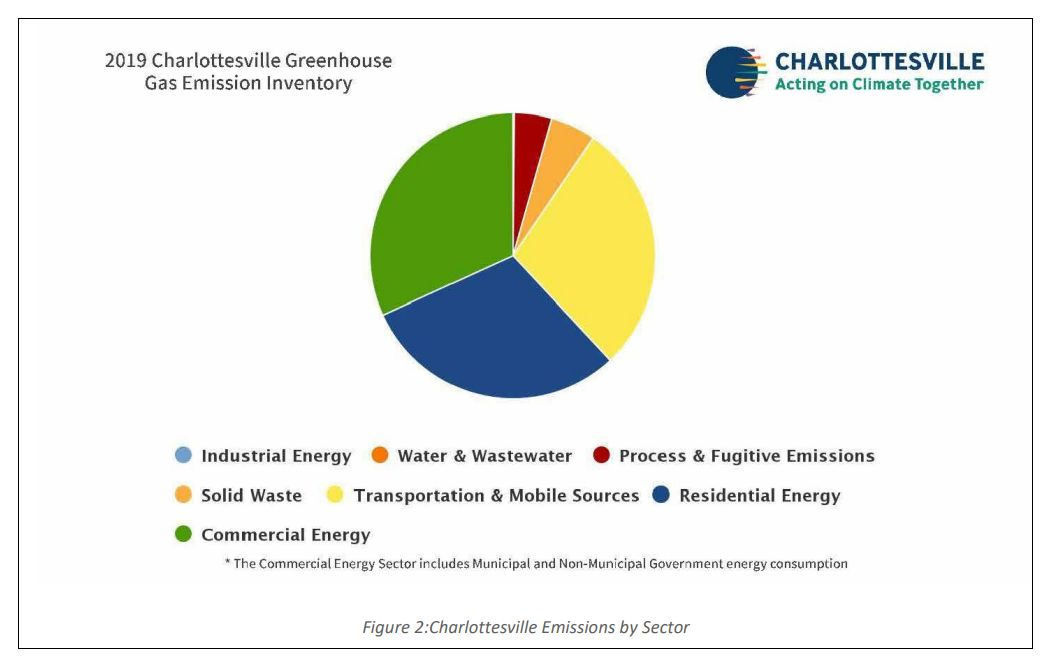
Notes to conclude episode #436
Another episode complete, and when will the next one be? Hopefully tomorrow. There’s a lot to review from previous weeks, as well as more information to sift through for future stories. Many of the segments eventually wind up on Information Charlottesville, an archive for this newsletter with hundreds of stories documenting public policy in this part of Central Virginia.
Support comes from paid subscribers to this newsletter. About one in four do so, and I’m grateful for that support which helps me planning ahead for future episodes and expansions. A bonus is that Ting will match your first payment, which helps shore up that planning into implementation.
And if you sign up for Ting through this link in this newsletter, you’ll get a free standard install, your 2nd month free, and a $75 Downtown Mall gift card! Enter the promo code COMMUNITY to get those benefits. Thank you, Ting!
Music in the podcast version comes from a musical entity known as Wraki, a musical entity you can sample more of if you purchase the album Regret Everything on Bandcamp. Pay what you want! Thank you, Wraki!
Finally today, want to know when the next edition is going to come out? Follow Town Crier Productions on Twitter.





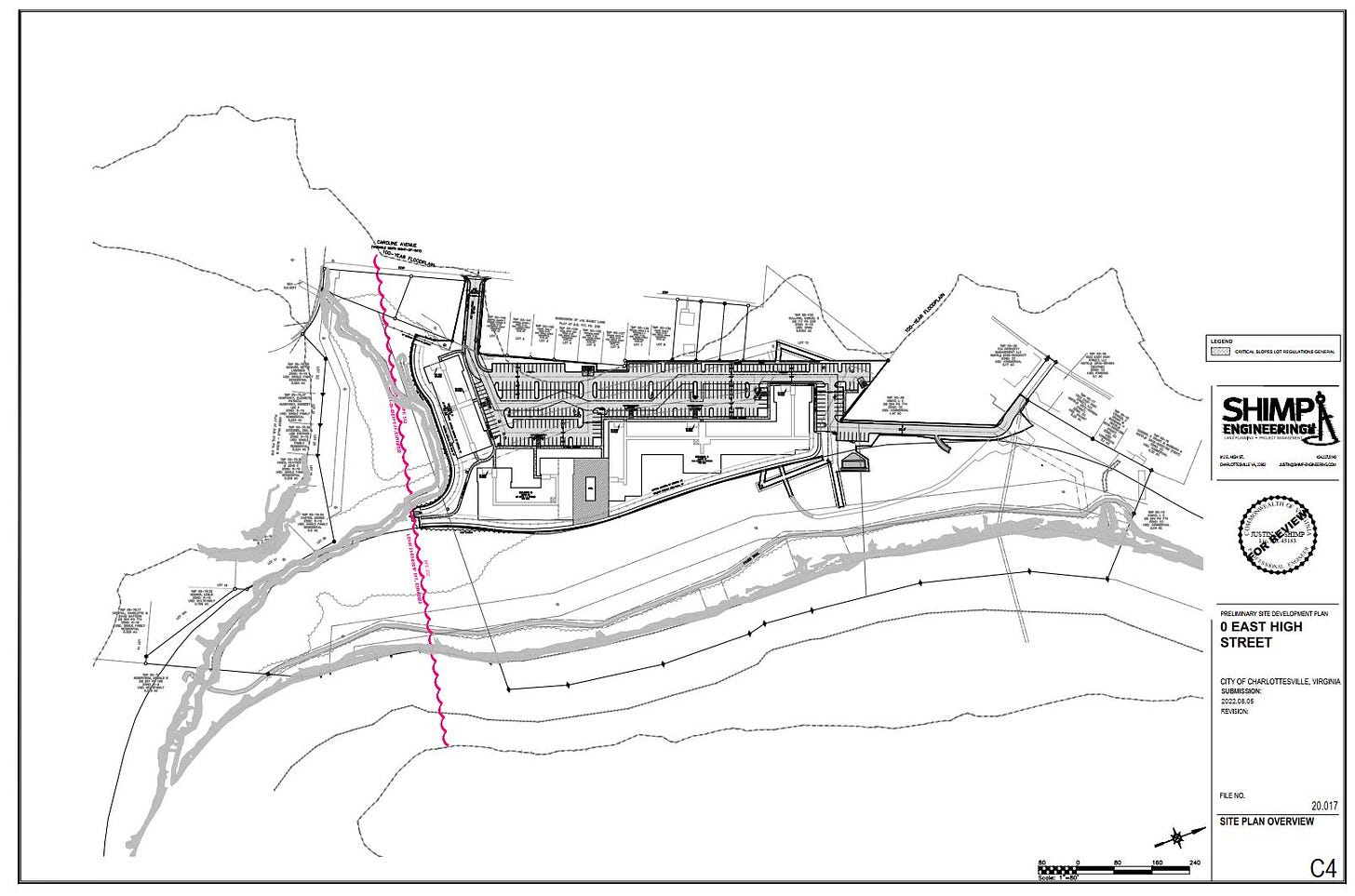











Share this post